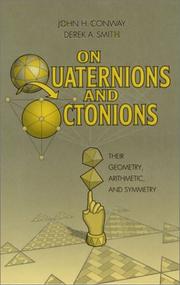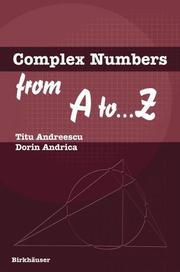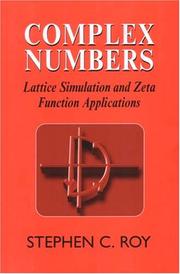| Listing 1 - 4 of 4 |
Sort by
|

ISBN: 1568811349 Year: 2003 Publisher: Natick, Mass. Peters
Abstract | Keywords | Export | Availability | Bookmark
 Loading...
Loading...Choose an application
- Reference Manager
- EndNote
- RefWorks (Direct export to RefWorks)
Group theory --- Quaternios. --- Álgebra. --- Quaternions. --- Cayley numbers. --- Quaternions --- 511.147 --- Complex numbers. Imaginaries --- 511.147 Complex numbers. Imaginaries --- Álgebra. --- Cayley numbers --- Algebra, Universal --- Algebraic fields --- Curves --- Surfaces --- Numbers, Complex --- Vector analysis --- Cayley numbers (Algebra) --- Octonions --- Nombres hypercomplexes --- Geometrie

ISBN: 0691027951 1282569228 1400833892 9780691027951 Year: 2010 Publisher: Princeton, NJ : Princeton University Press,
Abstract | Keywords | Export | Availability | Bookmark
 Loading...
Loading...Choose an application
- Reference Manager
- EndNote
- RefWorks (Direct export to RefWorks)
Today complex numbers have such widespread practical use--from electrical engineering to aeronautics--that few people would expect the story behind their derivation to be filled with adventure and enigma. In An Imaginary Tale, Paul Nahin tells the 2000-year-old history of one of mathematics' most elusive numbers, the square root of minus one, also known as i. He recreates the baffling mathematical problems that conjured it up, and the colorful characters who tried to solve them. In 1878, when two brothers stole a mathematical papyrus from the ancient Egyptian burial site in the Valley of Kings, they led scholars to the earliest known occurrence of the square root of a negative number. The papyrus offered a specific numerical example of how to calculate the volume of a truncated square pyramid, which implied the need for i. In the first century, the mathematician-engineer Heron of Alexandria encountered I in a separate project, but fudged the arithmetic; medieval mathematicians stumbled upon the concept while grappling with the meaning of negative numbers, but dismissed their square roots as nonsense. By the time of Descartes, a theoretical use for these elusive square roots--now called "imaginary numbers"--was suspected, but efforts to solve them led to intense, bitter debates. The notorious i finally won acceptance and was put to use in complex analysis and theoretical physics in Napoleonic times. Addressing readers with both a general and scholarly interest in mathematics, Nahin weaves into this narrative entertaining historical facts and mathematical discussions, including the application of complex numbers and functions to important problems, such as Kepler's laws of planetary motion and ac electrical circuits. This book can be read as an engaging history, almost a biography, of one of the most evasive and pervasive "numbers" in all of mathematics. Some images inside the book are unavailable due to digital copyright restrictions.
Number theory --- Numbers, Complex --- 511.147 --- 517.53 --- #WSCH:AAS2 --- #TELE:SISTA --- Complex numbers --- Imaginary quantities --- Quantities, Imaginary --- Algebra, Universal --- Quaternions --- Vector analysis --- Complex numbers. Imaginaries --- Functions of a complex variable --- Numbers, Complex. --- 517.53 Functions of a complex variable --- 511.147 Complex numbers. Imaginaries

ISBN: 0817643265 0817644490 Year: 2005 Publisher: Boston, MA : Birkhäuser Boston : Imprint: Birkhäuser,
Abstract | Keywords | Export | Availability | Bookmark
 Loading...
Loading...Choose an application
- Reference Manager
- EndNote
- RefWorks (Direct export to RefWorks)
It is impossible to imagine modern mathematics without complex numbers. Complex Numbers from A to . . . Z introduces the reader to this fascinating subject that, from the time of L. Euler, has become one of the most utilized ideas in mathematics. The exposition concentrates on key concepts and then elementary results concerning these numbers. The reader learns how complex numbers can be used to solve algebraic equations and to understand the geometric interpretation of complex numbers and the operations involving them. The theoretical parts of the book are augmented with rich exercises and problems at various levels of difficulty. A special feature of the book is the last chapter, a selection of outstanding Olympiad and other important mathematical contest problems solved by employing the methods already presented. The book reflects the unique experience of the authors. It distills a vast mathematical literature, most of which is unknown to the western public, and captures the essence of an abundant problem culture. The target audience includes undergraduates, high school students and their teachers, mathematical contestants (such as those training for Olympiads or the W. L. Putnam Mathematical Competition) and their coaches, as well as anyone interested in essential mathematics.
Numbers, Complex. --- Complex numbers --- Imaginary quantities --- Quantities, Imaginary --- Mathematics. --- Algebra. --- Algebraic geometry. --- Geometry. --- Number theory. --- Number Theory. --- Algebraic Geometry. --- Numbers, Complex --- 511.147 --- 511.147 Complex numbers. Imaginaries --- Complex numbers. Imaginaries --- Algebra, Universal --- Quaternions --- Vector analysis --- Geometry, algebraic. --- Mathematics --- Euclid's Elements --- Algebraic geometry --- Geometry --- Mathematical analysis --- Number study --- Numbers, Theory of --- Algebra --- Geometry, Algebraic.

ISBN: 0857099426 1904275257 9780857099426 9781904275251 Year: 2006 Publisher: Chichester, England : Horwood Publishing,
Abstract | Keywords | Export | Availability | Bookmark
 Loading...
Loading...Choose an application
- Reference Manager
- EndNote
- RefWorks (Direct export to RefWorks)
An informative and useful account of complex numbers that includes historical anecdotes, ideas for further research, outlines of theory and a detailed analysis of the ever-elusory Riemann hypothesis. Stephen Roy assumes no detailed mathematical knowledge on the part of the reader and provides a fascinating description of the use of this fundamental idea within the two subject areas of lattice simulation and number theory.Complex Numbers offers a fresh and critical approach to research-based implementation of the mathematical concept of imaginary numbers. Detailed coverage includes:
Numbers, Complex. --- Lattice theory. --- Functions, Zeta. --- Lattices (Mathematics) --- Space lattice (Mathematics) --- Structural analysis (Mathematics) --- Algebra, Abstract --- Algebra, Boolean --- Group theory --- Set theory --- Topology --- Transformations (Mathematics) --- Crystallography, Mathematical --- Zeta functions --- Complex numbers --- Imaginary quantities --- Quantities, Imaginary --- Algebra, Universal --- Quaternions --- Vector analysis --- Functions, Zeta --- Lattice theory --- Numbers, Complex --- 511.147 --- 511.147 Complex numbers. Imaginaries --- Complex numbers. Imaginaries
| Listing 1 - 4 of 4 |
Sort by
|

 Search
Search Feedback
Feedback About UniCat
About UniCat  Help
Help News
News